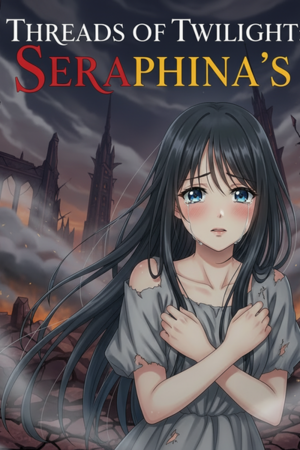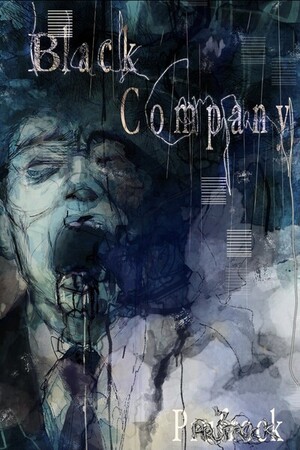Chapter 14:
King's Frustration
Threads of Twilight: Akari & Ren
Weeks bled into a monotonous, twilight haze, each day indistinguishable from the last, marked only by the slow, silent accumulation of dust on forgotten scrolls. Ren had descended from the Obsidian Throne, forsaking the trappings of kingship and the counsel of his chieftains for the dusty, suffocating silence of Sheol’s Great Library. The vast, cavernous space, with its towering shelves carved into the living rock and its countless scrolls, cracking codices, and heavy, rune-etched stone tablets, had become his prison and his entire world. The terrified lore-keepers, ancient Fallen with skin like dried parchment and wings as brittle as autumn leaves, scurried to do his bidding, their silent, fearful deference a constant, grating reminder of the crown he had temporarily abandoned.
They brought him everything. Texts on divine architecture that spoke of Zion as a structure built not of stone but of solidified faith. Esoteric treatises on the creation of the first Light-Bringers, which described them as living conduits for the will of The Most High. Historical accounts of Zion’s countless victories, each one a self-aggrandizing testament to the barrier’s invincibility. They even brought him the forbidden texts, the apocryphal theories on the very nature of The Most High, written by heretics and mad prophets, which whispered of their creator not as a being of light, but as one of absolute, unforgiving, and sterile order. He devoured them all, his grey eyes scanning the cryptic, angular runes of the Old Tongue of Ash, his mind a frantic, desperate engine sifting through mountains of dogma, history, and myth, searching for a single flaw, a single contradiction, a single crack in the myth of Zion's perfect, unbreachable defense.
There was nothing.
Every text, every scholar, every historical account, from the most devout psalm to the most blasphemous heresy, told the same, damning story. The holy barrier of Zion was a perfect work, a seamless shield woven from the very fabric of The Brilliant Light by The Most High at the dawn of the world. It was not a wall that could be battered down; it was a fundamental law of reality, as absolute and unchangeable as gravity or the passage of time. It had never been breached. According to every source he could find, it could not be breached. The words became a maddening, repetitive chorus that echoed in the silent library and in the increasingly frayed corridors of his mind.
“It is absolute, my King,” an ancient, trembling lore-keeper whispered one evening. The old Fallen, whose name Ren had never bothered to learn, had watched his king spend three straight days and nights without sleep or food, hunched over a single, massive codex on holy fortifications, his energy sustained only by a cold, burning desperation. “It has no weakness. No seam. No source that can be cut. It simply… is.”
That was the final straw. The simple, honest, and utterly hopeless statement, delivered with a tone of sympathetic finality, was the spark that ignited the vast, volatile reservoir of his frustration. The quiet, obsessive focus that had sustained Ren for weeks, the very thing that had kept the howling chaos of the Void at bay, finally, catastrophically, snapped. A low growl rumbled in his chest, a sound that was not entirely human, the sound of a cornered, wounded animal. He looked at the mountain of scrolls and tablets piled on the massive obsidian table before him—weeks of his life, weeks of his people’s hope, all of it utterly, completely useless.
“Useless,” he hissed, the word a puff of cold, vaporous air in the chilly library. With a purely human snarl of rage, born of sleeplessness, grief, and the sudden, crushing weight of his own failure, he slammed his fist down on the table.
But his fist was no longer merely human. It was a conduit for the unbridled, untamed power of the Absolute Void.
The obsidian table, a slab of solid volcanic glass a foot thick and weighing several tons, did not crack or break. It exploded. It turned to a silent, instantaneous shower of black dust and razor-sharp shrapnel that shot across the library with the force of a cannon blast. The sonic boom of the impact, a deafening CRACK that was felt more than heard, threw the ancient lore-keepers from their feet. Scrolls were blasted from their shelves, ancient stone tablets shattered against the far walls, and a rain of pulverized obsidian fell like black snow in the sudden, ringing silence.
Ren stood there, his hand still clenched, his arm trembling, panting in the aftermath of his own unintentional destruction. His rage was not spent. It had only been given a taste of release, and now it demanded more. He threw his head back and roared. It was not the amplified, terrifying, will-imposing shout he had used on the battlefield. This was a sound of pure, personal, and profound agony. It was the roar of a soul that had been pushed past its breaking point, a sound of grief and fury and utter, pathetic helplessness.
But the Void took that raw, human pain and gave it power. The roar became a physical shockwave, a wave of pure, weaponized despair that erupted from him, tearing through the library. The foundations of the fortress groaned. The very rock of Sheol trembled. In the city streets far below, the dim purple light from the great crystals flickered and dimmed, as if in fear. The Fallen, going about their quiet, twilight lives, stopped dead in the streets, their unnatural, glowing eyes turning toward the King’s spire with a renewed sense of dread. The children, who had been playing a game with glowing pebbles in a quiet square, began to cry, clinging to their mothers in terror at the terrifying, earth-shaking sound of their new King’s pain.
In the library, the lore-keepers were huddled on the floor, their brittle, ancient wings wrapped around their heads, shaking in primal, instinctual fear. As the last, mournful echo of his roar faded, Ren stood panting amidst the ruin he had created. His rage was finally spent, leaving only a hollow, aching, and shame-filled exhaustion. He was a failure. A king of nothing who couldn't even protect the one person he was supposed to. A monster who had just terrified the very people he was meant to lead. The familiar, crushing weight of his own self-loathing, an old and hated companion, settled back over him like a heavy, cold shroud.
His gaze swept blankly across the floor, now littered with the dust of the table and the shredded, confetti-like fragments of ancient, irreplaceable texts. The sight was a testament to his own pathetic lack of control. But then, as the black dust settled, his eyes caught on something. A single, oddly intact fragment of a scroll lay near his feet, having been blown clear of the main blast. It was from a heretical text he had just disintegrated, a piece of blasphemous poetry the mages had warned him was the work of a mad prophet who had been executed for his visions. He knelt, his movements slow and weary, and picked it up. Most of the angular runes were scorched and unreadable, but a single, cryptic passage, framed by the burned edges of the parchment, remained.
…for The First Liar commands not with force, but with presence. The abyss does not break the walls; it is already inside them. For all that is shadow is but a finger of the same hand, and where one finger touches, the hand may feel…
Ren stared at the words, reading them again and again. It wasn't a spell. It wasn't a ritual. It wasn't a structural weakness. It was a riddle. A piece of insane, philosophical nonsense. All shadows are but a finger of the same hand. The rage, the violent storm that had been shaking his very soul, began to quiet. It was replaced by a new, fragile, and intensely focused curiosity. He looked at the long, distorted shadow his own body cast on the floor. Then he looked at the deep, absolute darkness gathered in the far, rubble-strewn corners of the library. They were not separate things. According to this mad prophet, they were… connected. The idea was impossible. It was the logic of a lunatic. But it was the first thing he had read in weeks that did not speak of an unbreakable wall. It spoke of a door.
While Ren raged against an absolute, Akari was learning to navigate one. In the same intervening weeks, she had become the perfect saint, her days in Zion a meticulous, flawless performance. She attended morning prayers with Malachi, her head bowed in serene piety, her voice in the alien tongue of Eden a perfect, soaring note in the choir’s hymn. She sparred with General Gideon, and while she would never be a true swordswoman, her movements had lost their initial, clumsy hesitation, replaced by a fluid, defensive grace that was mesmerizing to watch. She had learned to let the Brilliant Light flow through her in small, controlled bursts, a skill that left the hardened General both impressed and vaguely unnerved.
Her greatest triumphs, and her most valuable intelligence-gathering opportunities, were in the Citadel’s infirmaries. She would spend hours with the soldiers who had been wounded in the battle at the Vale of Gehenna, her presence a calming, holy balm. She would sit with them on the edge of their cots, listen to their stories, and offer a gentle, healing touch. Her power, born of a pure, genuine empathy she could not suppress, would flow from her, easing their pain, mending wounds that their finest healers had struggled with. She quickly became an object of intense, personal adoration among the common soldiers and the Citadel’s populace. They saw her as a true messenger from The Most High—not just a weapon of war, but a being of profound, divine compassion. Malachi and Gideon, in turn, saw a tool that was becoming more effective, more beloved, than they could have possibly hoped. They granted her more freedom, more trust, a longer leash.
Akari saw an opportunity. Her internal world was a cold, calculated map of her prison. While Malachi lectured her on the divine history of the Protectors of the Covenant, she was studying the ancient architectural diagrams of the Citadel displayed in the illuminated texts, her photographic memory, once used for memorizing lyrics and dance steps, now dedicated to memorizing the layout of its aqueducts and long-forgotten siege passages. While she walked the high ramparts in "prayerful meditation" with the ever-present but increasingly trusting Seraphina, she was observing the patrol schedules of the elite Seraphim Guard, noting the timing of their shifts, the numbers at each post, the blind spots in their coverage.
While she healed the soldiers, she would ask them seemingly innocent, pious questions, her voice a soft, gentle murmur of curiosity. “The barrier is so beautiful from the high walls,” she might say to a young, wounded knight whose broken leg she was mending, his eyes wide with a mixture of pain and puppy-like adoration for her. “It feels like the very breath of The Most High. How is its light channeled? Does it come from the High Temple itself?”
The young knight, eager to share the glories of his home with his savior, would answer with pride. “Oh no, my lady. The High Temple is but a focus. The true source is much deeper, much more sacred. The Heart of Zion. It is a great crystal, a fragment of creation itself, housed deep beneath the Pontiff's private sanctum. It is the holiest place in all the world.”
And so, piece by painstaking piece, she assembled her puzzle. She learned the barrier was powered by a great, celestial crystal called the Heart of Zion. She learned of secret tunnels used to move supplies during ancient sieges, their entrances now sealed but perhaps not impassable. Her desperation was no less than Ren's, but where his boiled over into explosive, destructive rage, hers had been chilled into a patient, meticulous, and deadly plan. She was a coiled spring, gathering information, earning trust, and waiting for the perfect, single moment to act. She was a spy, playing the most important role of her life, and she would not allow herself to fail.




Please sign in to leave a comment.